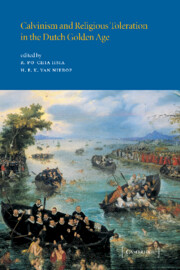Book contents
- Frontmatter
- Contents
- Notes on contributors
- 1 Introduction
- 2 ‘Dutch’ religious tolerance: celebration and revision
- 3 Religious toleration in the United Provinces: from ‘case’ to ‘model’
- 4 The bond of Christian piety: the individual practice of tolerance and intolerance in the Dutch Republic
- 5 Religious policies in the seventeenth-century Dutch Republic
- 6 Paying off the sheriff: strategies of Catholic toleration in Golden Age Holland
- 7 Sewing the bailiff in a blanket: Catholics and the law in Holland
- 8 Anabaptism and tolerance: possibilities and limitations
- 9 Jews and religious toleration in the Dutch Republic
- 10 Religious toleration and radical philosophy in the later Dutch Golden Age (1668–1710)
- 11 The politics of intolerance: citizenship and religion in the Dutch Republic (seventeenth to eighteenth centuries)
- Select bibliography
- Index
6 - Paying off the sheriff: strategies of Catholic toleration in Golden Age Holland
Published online by Cambridge University Press: 08 July 2009
- Frontmatter
- Contents
- Notes on contributors
- 1 Introduction
- 2 ‘Dutch’ religious tolerance: celebration and revision
- 3 Religious toleration in the United Provinces: from ‘case’ to ‘model’
- 4 The bond of Christian piety: the individual practice of tolerance and intolerance in the Dutch Republic
- 5 Religious policies in the seventeenth-century Dutch Republic
- 6 Paying off the sheriff: strategies of Catholic toleration in Golden Age Holland
- 7 Sewing the bailiff in a blanket: Catholics and the law in Holland
- 8 Anabaptism and tolerance: possibilities and limitations
- 9 Jews and religious toleration in the Dutch Republic
- 10 Religious toleration and radical philosophy in the later Dutch Golden Age (1668–1710)
- 11 The politics of intolerance: citizenship and religion in the Dutch Republic (seventeenth to eighteenth centuries)
- Select bibliography
- Index
Summary
To be a practising Roman Catholic in the city of Gouda during the seventeenth century was sometimes an expensive proposition. In the early 1600s, Catholics paid 400 guilders per year in recognition money to the city's bailiff (baljuw) to allow their priests to celebrate the sacraments in peace. This arrangement, however, did not prevent the bailiff from routinely disrupting services through the 1620s, collecting fines to free incarcerated priests, and demanding even higher payments from the Catholic community. In 1625 the bailiff Anthony Cloots insisted that the priest Petrus Purmerent provide still more cash, but the cleric refused until the law officer in turn accommodated more Catholic worship. By 1631 a new bargain was struck that afforded Catholics some breathing-space, but later that same year the town government appointed a new bailiff, Anthoni van der Wolff, and the persecutions began anew. Unlike his predecessor, Van der Wolff initially had no interest, pecuniary or otherwise, in religious toleration, and he pursued Gouda's Catholics with sectarian zeal. Even his wife (described by the Catholic chronicler Ignatius Walvis as the ‘she-wolf’) disguised herself as a klopje (an unmarried Catholic lay sister), in order to infiltrate clandestine Catholic worship services.
Until the early 1640s Gouda's Catholic community suffered persistent harassment and persecution under Van der Wolff's judicial regime. In 1644, however, the bailiff and the Catholic clergy unexpectedly reached a truce and together negotiated an arrangement.
- Type
- Chapter
- Information
- Calvinism and Religious Toleration in the Dutch Golden Age , pp. 87 - 101Publisher: Cambridge University PressPrint publication year: 2002
- 3
- Cited by



